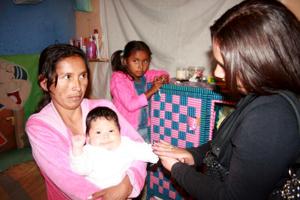
Fabiola Diaz Lopez lost her husband, farm and home in the Colombian countryside in 2010 to the Colombian armed conflict. She traveled, 5 months pregnant, for 13 hours to get to the Pasto, Colombia, refuge for displaced people, which is funded by Catholic Relief Services. She now lives in an apartment with her four children, including her daughter, Joan, who was born in October, 2010. She receives food and hygiene kits through a program supported by CRS. Credits: CRS
By Adriana Arrieta
Peace remains elusive in Colombia. Over 45 years of civil war has forced one in ten people from their homes today.
Every day a Colombian is stripped of his belongings, his home or his life. His dreams, desires, and hopes are stolen.
Many are forced to migrate to another city in which they can live in peace.
Others have no choice but to abandon the country, in hope of fleeing from all the problems that afflict them and with which the government has been unable to help with.
Figures from the NGO Consultancy for Human Rights and Displacement (CODHES) show 280,000 people were forced from their homes in Colombia in 2010 alone. They say Colombia has the highest combined internally displaced and refugee population in the world ( 5.28 million).
It is a huge humanitarian crisis that most of the world has forgotten, and “international public awareness about the gravity of our situation is scarce …”, says Msgr Héctor Fabio Henao, Secretary General of Caritas Colombia.
The Catholic Church in Colombia has played a fundamental role in assisting the victims of armed conflicts. The church says that in order to reach peace, reconciliation of all actors is needed, which in turn requires truth, justice, and reconciliation.
The Church has supported “Peace Week” every September for over 15 years. The event hopes to generate awareness about the tragic situation and to remember the deceased victims of the armed conflict and repair the damage caused to those affected.
Peace Week’s beginnings go back to 1986 when two priests decided support was required for peace-seeking initiatives from society. After several local initiatives, in 1988 the first “Peace Week” was held in Colombia. This event became an institution and has been organised every year since 1994.
Indigenous groups, union leaders, human rights groups, and others in favour of peace participate. It is a space for reflection and contrition, in search of Colombia’s highly desired and elusive peace.
The week’s motto is, “Each life is unrepeatable, each person irreplaceable, and each death irreversible”.
Laura Chacón González, of Caritas Colombia explained that it has become a “large national movement that represents Colombian resistance to living in a situation of generalised conflict”
This year’s events were overshadowed by the assassination of the priests José Reynel Restrepo and Gualberto Antonio Oviedo Arrieta in September 2011, both during that month.
Fr Restrepo, 36 years old and parish priest in the municipality of Marmato, was part of a defense committee against the imminent exploitation of an open pit mine in the area. On September 1st the priest was murdered while driving his motorcycle in the countryside after visiting his family.
Days later Fr Oviedo Arrieta from Capurganá (Chocó), was killed with a machete. He was the sixth Catholic priest assassinated in Colombia during the year.
Laura Chacón says that despite these tragic setbacks, the work continues. She highlighted plans “to create communication spaces between base initiatives, educational institutions, NGOs, churches, high government levels and the international community” over the coming months.
She says, “the Caritas grassroots network enables the understanding of the humanitarian crisis and makes us witnesses of what is happening in the various regions.
“We have established close relations with government bodies for the defence and protection of human rights, such as the early warning system from the ombudsman and victim attention centre”.
At the international level, she says, “We are supported by the Caritas Working Group for Colombia, consisting of CAFOD (Caritas England and Wales), Trócaire (Caritas Ireland), Spain, Switzerland, Norway, France, Germany, CORDAID (Caritas Netherlands, and CRS (a Caritas member with headquarters in the USA).
“Their role has been very important in fostering objectives, strategies, and common practices … to energise the work done by Caritas Colombia.”
